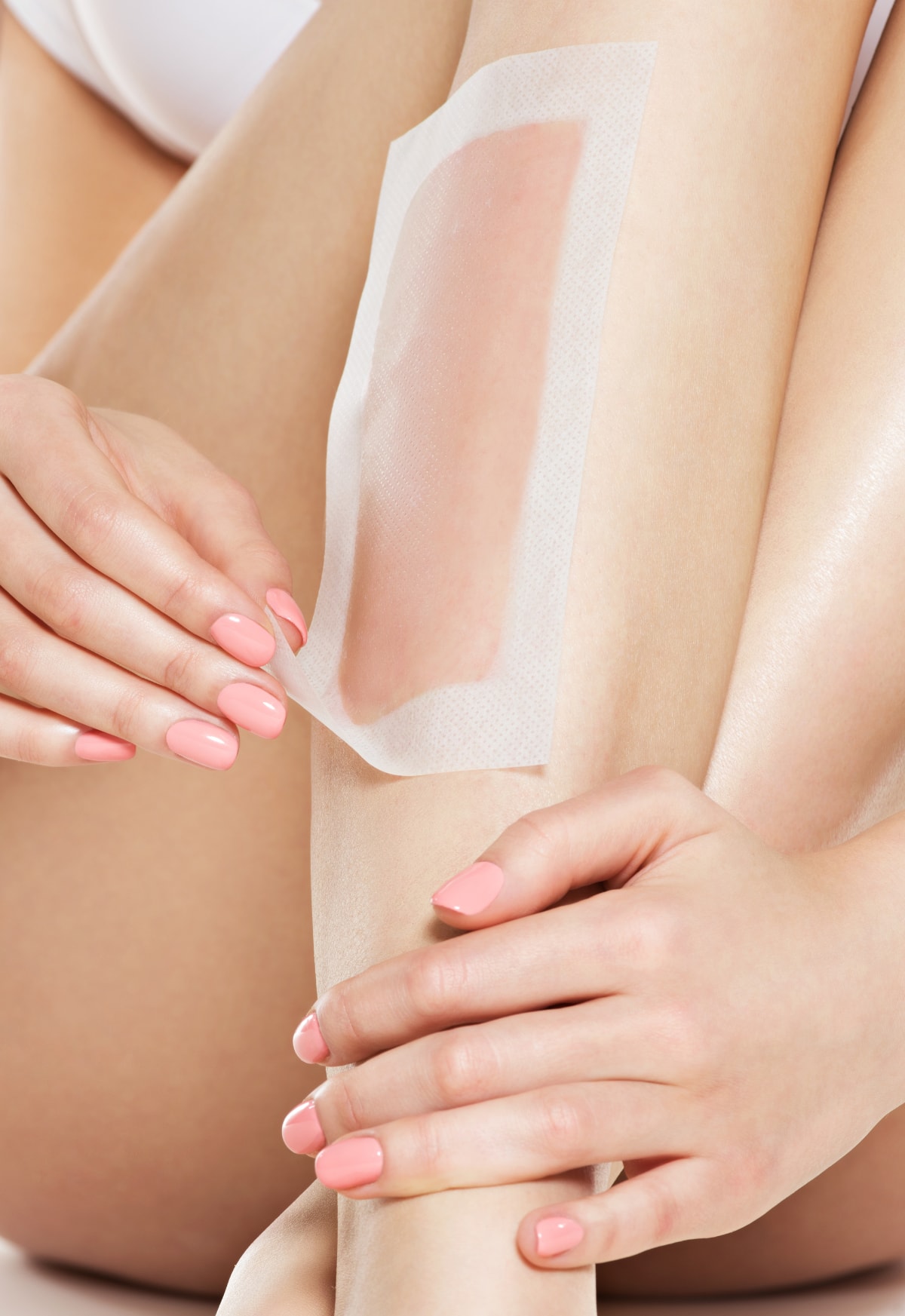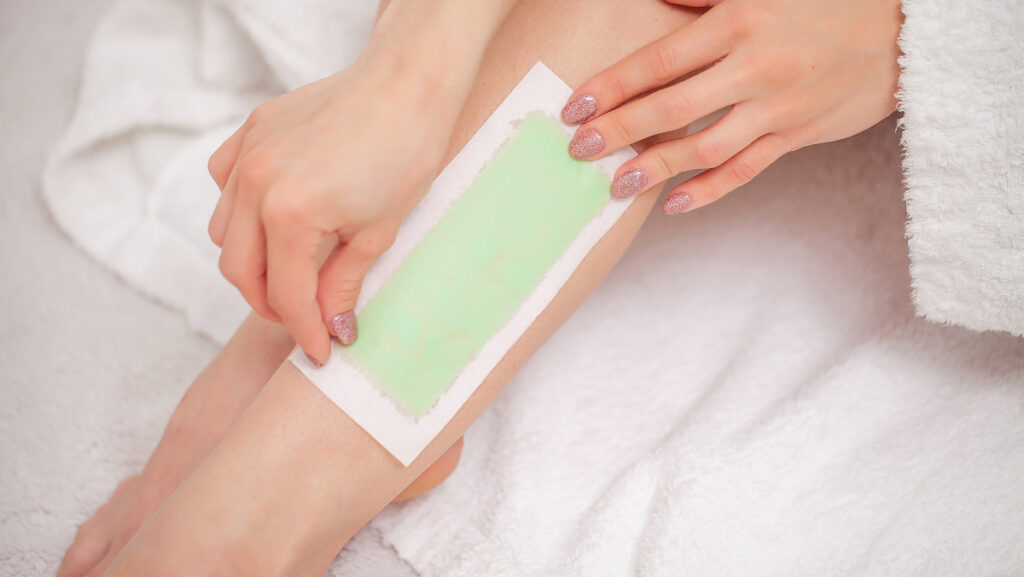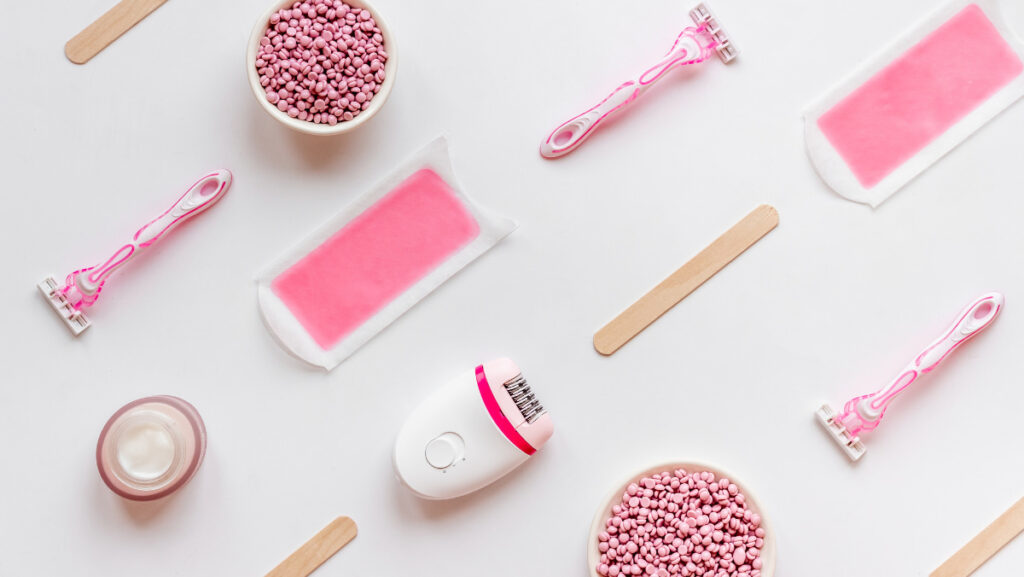
Ever found yourself in a sticky situation when it comes to hair removal? Well, waxing strips might just be your smooth-sailing solution. Easy to use and cost-effective, these little gems have become a staple in many home beauty routines.
But you’re probably wondering: “What makes them so great?” Let’s dive into that! We’ll explore how they work their benefits and even share some tips on how to get the best results from your waxing strip experience.
So grab your cup of coffee (or tea if you’re more of a tea person), sit back, and relax as we uncover the magic behind these nifty beauty tools.
It’s time for smoother skin without breaking the bank or spending hours at the salon!
What Are Waxing Strips?
So, you’ve heard about waxing strips or wax strips, and you’re a bit curious. Essentially, waxing strips are pre-coated with wax on one side. They’re designed to quickly and efficiently remove unwanted hair from your body or face.
You might wonder why they’ve become such a staple in many people’s beauty routines? Well, it’s all down to convenience and effectiveness. These little gems offer an easy way for you to get smooth skin without having to step foot in a salon.
Now, let’s talk about how they work! The strip is pressed onto the area where you want to remove hair firmly adhered by applying some pressure over it (usually with your hand).
Then comes the somewhat tricky part – pulling off the strip against the direction of hair growth. Sounds slightly terrifying? Don’t worry! With practice, this becomes much easier.
The great thing about waxing strips is that they come in different sizes tailored for various parts of your body:
- Facial Wax Strips: Smaller size, perfect for precise areas like upper lips or eyebrows.
- Body Wax Strips: Larger ones ideal for legs, arms, or underarms.
- Bikini Wax Strips: Specially shaped strips suitable for bikini line grooming.
You’ll find there are also several types based on skin sensitivity – regular, sensitive, skin-friendly versions and those infused with soothing ingredients like aloe vera or almond oil, which can help calm any post-wax redness!
One more thing worth mentioning: always check instructions before using any type of wax strip, as each brand may have specific guidelines on how best to use their product.

The Benefits Of Wax Strips
Wax strips are not just a beauty accessory; they’re a game-changer in your grooming routine. Here are some reasons why you’ll love them.
First off, wax strips are super convenient. You don’t have to mess around with hot wax or sharp razors anymore. Just peel, stick, and pull – voila! It’s that easy to get silky smooth skin at home.
Plus, did you know that they last longer? Unlike shaving, which just removes hair from the surface, wax strips pull out hair from the root. This means your skin stays smoother for weeks, not days! Now, isn’t that something?
And let’s talk about exfoliation. When you use these magical little strips, they also remove dead skin cells along with unwanted hair. So not only do you end up with fuzz-free skin but also a radiant glow!
Here’s another big plus – over time, regular use of waxing strips can result in slower and finer hair regrowth. That’s right, folks; it’s like hitting two birds with one stone!
Now, if you’re worried about pain – relax! Sure, there might be some discomfort initially, but it lessens over time as your body gets used to the process.
So what does all this mean for your pocket? Well, here is where things get interesting:
| Cost Comparison | Shaving | Wax Strips |
|---|---|---|
| Initial Cost | Low | Moderate |
| Ongoing Costs | High (frequent replacements) | Low (lasts longer) |
As you can see, while the initial cost of wax strips may be higher than razors, in the long run, they’re more economical because they last longer and require fewer replacements.
Types Of Wax Strips
When you’re looking to achieve silky smooth skin, wax strips are your go-to. There’s an array of types available on the market, each designed for different parts of your body and various hair types. Let’s dive right in and get to know these wonderful little tools a bit better.
Fabric Waxing Strips, or muslin waxing strips, often come pre-waxed. They’re made from fabric like cotton or muslin and are perfect if you’re just starting out with at-home waxing.
These strips don’t require heat – they’re ready to use straight from the pack! Plus, they’re ideal for sensitive skin since they usually contain natural ingredients like beeswax and essential oils.
Next up are Plastic Waxing Strips, also known as non woven waxing strips. These guys are super durable and won’t break or tear easily during the waxing process. If you’ve got thick hair that’s stubbornly rooted, this type is likely your best bet!
Then there are Paper Waxing Strips, which tend to be more economical compared to other types but may lack in durability – so keep that in mind when choosing which strip suits you best.
We can’t forget about Cold Wax Strips, either! Great for those who prefer not dealing with heated waxes or sticky situations – literally! Just press them onto your skin, give ’em a firm rub, peel off swiftly (like a band-aid!), and voila – no more unwanted fuzz!
Lastly, let’s talk about Hot Wax Strips. For these ones, you’ll need to heat them before application – but don’t worry! You’ll find detailed instructions on how to do it safely within their packaging.
Remember: Whatever kind of strip you choose should depend largely on what part of your body needs some hair-free TLC:
- Legs? Fabric or plastic strips would work well.
- Underarms? Cold wax strips might be ideal.
- Facial areas? Paper wax strips could fit the bill perfectly.
Wax away confidently, knowing there’s a variety out there just waiting for you!
How To Use Waxing Strips: Preparation, Application, Aftercare
So you’ve got your waxing strips, and you’re ready for smooth skin. But where do you start? Don’t worry – we’ve got your back! Let’s break it down into three simple steps: preparation, application, and aftercare.
First things first – preparation. Cleanse the area with a mild soap or body wash to remove any oils or lotions. Pat dry gently. Exfoliating the day before is also a good idea – it’ll help remove dead skin cells that could interfere with wax adherence.
Now, onto the application:
- Warm up the strip by rubbing it between your hands for about 30 seconds.
- Slowly separate the strip into two parts. 3- Press one of the strips onto your skin in the direction of hair growth. 4- Hold your skin taut and pull off quickly against the direction of hair growth.
Remember not to wax over an area more than twice in one session – that could lead to irritation!
Finally, let’s talk aftercare:
- Apply a soothing lotion or oil post-waxing
- Avoid hot showers/baths for at least 24 hours
- Stay away from direct sunlight and tanning beds for at least 48 hours
It’s also worth noting that everyone’s pain threshold varies, so don’t be discouraged if yours seems lower than others. And hey, there’s always ice cream afterward as a reward!
Tips And Tricks For Using Wax Strips
Let’s dive into some key tips and tricks to make your waxing strip experience smoother, shall we? Waxing strips can be a godsend when you’re after that silky smooth skin, but it’s not always as straightforward as it seems.
Firstly, prep your skin. Before even thinking about applying those strips, ensure your skin is clean and dry. If there’s any oil or moisture on the surface of your skin, it might hinder the wax from sticking properly.
Now, here’s something you might not have thought of – the direction matters! Always apply the wax strip in the direction of hair growth.
Then, pull it off swiftly in the opposite direction. It may sound counterintuitive, but trust me, this trick works wonders!
What about aftercare? You’ve just ripped out hair from its root, so naturally, there will be some sensitivity. To reduce inflammation and soothe irritation post-waxing:
- Apply a cold compress.
- Use products with aloe vera or witch hazel.
- Avoid hot baths/showers for 24 hours.
It might seem like an extra step, but believe me, your skin will thank you later!
One more thing: don’t forget to exfoliate between waxes! This helps prevent ingrown hairs by keeping dead skin cells from clogging up pores and trapping new hair growth underneath.
If you’re finding yourself getting red bumps or irritated spots following waxing sessions regularly, though…it could be time to switch up brands or types of strips used.
Everyone’s skin reacts differently, so don’t hesitate to experiment until you find what works best for YOU!
Best Wax Strips For Different Body Parts
So, you’ve decided to take the plunge and try out waxing at home. Good for you! But now comes the big question – Which wax strips are best for different body parts? Let’s break it down together.
When it comes to your legs, we’re talking about a larger surface area. You’ll want something that’s both effective and efficient.
Large leg waxing strips, like the Veet Leg & Body Wax Strip Kit, are your go-to here. They’re specifically designed to tackle more extensive areas while still giving you that smooth-as-silk finish.
Do you have sensitive skin? Don’t worry; we’ve got your back – or should I say face? When dealing with facial hair, especially around the delicate eyebrow area, smaller is better.
Look for products like Nad’s Facial Wax Strips, which are gentle on sensitive skin but tough on unwanted hair.
And what about those hard-to-reach places like bikini lines and underarms? You need something flexible yet powerful enough to deal with coarser hair types without causing irritation or discomfort. That’s where products such as Nair Sensitive Ready Wax Strips For Face & Bikini come into play!
Now, let’s make things easier with a quick reference table:
| Body Part | Recommended Product |
|---|---|
| Legs | Veet Leg & Body Wax Strip Kit |
| Face | Nad’s Facial Wax Strips |
| Bikini line/Underarms | Nair Sensitive Ready Wax Strips |

Wax Strips Compared To Other Methods
You’ve likely tried more than one method in your quest for silky smooth skin. Maybe you’ve even braved the somewhat intimidating realm of waxing strips.
But how do they stack up against other hair removal techniques? Well, that’s exactly what we’re here to discuss!
Waxing Strips vs. Shaving
Have you ever stood in the hair removal aisle, bewildered by all the options? Today, we’ll take a closer look at two popular methods: waxing strips and shaving.
Let’s start with waxing strips. They’re relatively easy to use – simply press on, wait a few seconds, then rip off (yikes!).
They work by sticking to your hair and pulling it out from the root when removed. This means that you’re not just removing what’s visible above the skin; you’re getting rid of the entire hair follicle.
Here are some quick facts about waxing:
- Long-lasting results – Because waxing removes hairs from their roots, they take longer to grow back.
- Smoother skin – Unlike shaving, which can leave stubble almost immediately, your skin stays smooth for weeks after waxing.
- Less irritation – If done correctly (always follow those instructions!), there is less chance of getting razor burns or cuts.
| Waxing Pros | Waxing Cons |
|---|---|
| Longer lasting results | Can be painful |
| Smooth finish | Requires some growth for effectiveness |
On the other hand, shaving is as straightforward as it gets! You glide a razor over your skin and cut off any visible hair. It’s an uncomplicated method but does come with its own set of considerations.
Some key points about shaving include:
- Quick and painless – No need to brace yourself before each stroke!
- No waiting time – You can shave whenever you want without needing any hair growth.
- Cheap and accessible – Razors are available everywhere at affordable prices.
| Shaving Pros | Shaving Cons |
|---|---|
| Fast & Painless | Results don’t last long |
| Always ready | Risk of cuts & nicks |
Waxing Strips vs. Sugaring
Let’s delve into the hot debate: sugaring vs. waxing strips. Which one is the top contender for your skin? We’re here to break it down for you.
First off, let’s talk about sugaring. This method uses a natural paste made from sugar, lemon juice, and water – sounds almost good enough to eat, right? It’s applied in the same direction of hair growth and then swiftly removed in the opposite direction.
What you’ll love about sugaring:
- Less Painful: Many find it less painful than waxing because it doesn’t stick as much to your skin.
- Gentler on Skin: Since it’s all-natural and water-soluble, cleanup is a breeze, and irritation is often minimal.
- Easier Hair Removal: It can remove shorter hairs compared to traditional wax.
Now, onto our second contender – waxing strips! These are pre-coated with wax that adheres firmly to your hair but not your skin.
The perks of using waxing strips include the following:
- Convenience: They’re ready-to-use, which makes them super handy when you’re pressed for time.
- Long-lasting Results: With proper use, they can keep you hair-free for up to four weeks!
It seems like both have their own set of benefits but also some considerations. While sugaring might be easier on your skin and less painful overall, don’t forget that temperature control can be tricky if you’re doing this at home!
On the other hand, while wax strips offer convenience and long-lasting results – some people may experience irritation or redness post-wax due to its stronger grip on hair follicles.
While we’ve given a fair fight between these two popular methods – your personal preference should always take center stage when choosing between sugaring vs. waxing strips!
Waxing Strips vs. Laser Hair Removal
Let’s dive right into the comparison between waxing strips and laser hair removal. You might be wondering, “Which one’s the best for me?” Well, it all boils down to your personal preference, budget, pain tolerance level, and long-term goals.
Waxing strips are a popular choice because they’re convenient and affordable. You can find them in most drugstores or online, making them easily accessible no matter where you live. Plus, they provide instant results!
However, there’s a catch – it can be painful (you’re ripping hair out from the roots), and you’ll need to repeat the process every few weeks as your hair grows back.
On the other hand, we’ve got laser hair removal – a method that targets your hair follicles with tiny high-heat lasers. Sounds scary? It isn’t really! Many folks find it less painful than waxing strips.
One of its main perks is that it offers more permanent results over time. But remember: this doesn’t mean your hairs won’t ever grow back – but when they do, they’ll likely be thinner and lighter in color.
However, here’s what might make you pause: The cost of laser treatments can run pretty high compared to buying a pack of waxing strips at your local store.
| Cost Comparison | Wax Strips | Laser Treatment |
|---|---|---|
| Initial Cost | Low | High |
| Long-Term Cost | Medium | Low |
So which one should you choose?
- If you want something quick and easy without breaking the bank — go for waxing strips.
- If long-term convenience trumps initial costs for you — consider investing in laser treatments.

Final Thoughts On Waxing Strips
It’s clear that waxing strips are a handy tool in your beauty arsenal. They’re easy to use, convenient for travel, and can save you from those pricey salon visits. But remember, it’s not all roses and sunshine.
Let’s be real – waxing isn’t painless. If it’s your first time or if you have sensitive skin, there might be some discomfort involved. Don’t let this scare you off, though! There are plenty of tips and tricks out there to minimize the ouch factor:
- Take a warm shower before waxing
- Exfoliate your skin
- Use numbing creams
Also worth noting is the importance of aftercare. Your skin just went through a bit of trauma – treat it kindly afterward! Apply soothing lotions or aloe vera gel to calm any inflammation.
And lastly, remember that practice makes perfect! You might not get it right on the first try, but don’t give up – you’ll get better with each attempt.
Waxing strips aren’t for everyone though; some prefer other methods like shaving or laser hair removal. That’s okay, too – beauty routines should cater to individual needs.
Frequently Asked Questions
